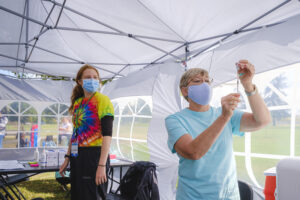Caring for patients for more than 50 years: Sally’s story

Nurse Sally Loprinzi works a COVID-19 vaccine clinic.
Sally Loprinzi, a nurse at Neighborhood Health Center’s largest clinic, has been with NHC since the nonprofit opened ten years ago.
At a time when so many are leaving the profession, Sally still speaks with joy and enthusiasm about the career she entered more than half a century ago. When asked what she loves best about nursing, she responds with a smile: “I love it all.”
“I love the people I work with,” she adds. “We have a great team at Tanasbourne. And I enjoy the patients and assisting them with their needs.”
Sally — “Miss Sally” as she’s known to patients — finds working with her youngest patients especially rewarding. “Pediatrics was my focus for many many years and I enjoy being around the kids. I enjoy giving immunizations — as difficult as it can be.”
Her favorite moments? “When I see patients back and they are happy to see me. It’s the kids that give me a big hug after a poke…”
She acknowledges that much has changed over the last 50+ years and as a woman, her options were pretty limited.
“When I was young, my choices were nurse, teacher, or secretary,” she explains. “My sister was a nurse. I thought I would be a nurse.”
And Sally never looked back. Her storied career has taken her from caring for patients in Montana, to working among tribal communities in Alaska, to providing care for marginalized and underserved populations in Portland, Oregon. (Sally attended nursing school and got her start in Portland at what is now Legacy Health, so returning to Oregon after her husband passed away was a full-circle moment for her.)
Sally got her start in pediatrics and discovered her love for public health along the way. “I couldn’t go into public health so I went back to school and got my BSN,” she explains. It’s that passion and determination that has helped carry Sally through some of the more challenging times in her career and helped prepare her for the COVID-19 pandemic.
A day in the life of a community health center nurse
Sally works 10-hour days, beginning each shift by checking MyChart messages before returning calls from patients. “People don’t usually want to hear from me at seven in the morning,” she says with a smile.
Her days are spent taking calls and responding to MyChart messages and filled with nursing visits, blood pressure checks, stitch removal, immunizations, as well as plenty of paperwork and various tasks to assist NHC’s providers. She also holds vaccine clinics, administering COVID vaccines to up to 30 patients per event.
Sally shares that some of the patient interactions that have stuck with her are the ones that often seem minor at the time:
“I remember an older gentleman that was coming into the clinic. He was having health concerns following surgery. I gave him some suggestions over the phone about what he could do to relieve some of the symptoms. The next time he came in he gave me a big and said ‘thank you, thank you.’” she recalls fondly.
Years later, that same patient still comes in and seeks Sally out for a big hug.
Unprecedented times
As for the challenges brought on by Covid? “It’s just been vast,” she says. She notes that everyone seemed more nervous and on edge to begin with. There were so many unknowns. Sally spent much of her time at the outset of the pandemic doing more education on the phone.
As the vaccines were developed and rolled out, that focus shifted and with it came new public health challenges.
“We had very good turnouts for our vaccination clinics, but still a number of folks continue to be very reluctant. It’s really been an eye opener.”
Sally expresses frustration at some of the vaccine hesitancy she sees, especially among parents of young children:
“They didn’t see children with measles or polio getting hospitalized. They never saw those diseases.”
“I just spoke with a mother yesterday whose daughter will not get vaccinated. I guess you’ll always have that,” she sighs.
With her deep background in public health, Sally recognizes the role that public education plays and laments that more wasn’t done at the outset of the pandemic to stem the tide of misinformation: “It was the perfect storm. It really was devastating.”
While her passion and enthusiasm for caring for patients hasn’t waned, Sally acknowledges the toll the pandemic has taken and how it’s impacting community health in particular.
“I definitely see the exhaustion. There’s this sense that we’ve faced this already,” she explains.
“In community health it’s very difficult to get providers. We really need more providers,” she adds.
The pandemic has placed a unique pressure on nurses who are triaging and prioritizing the needs of patients that have put off care and haven’t been seen for a long time and on providers who are sometimes charting late into the evening:
“When they do come in they are ready to get everything taken care of. It can be overwhelming.”
Sally notes that many of the patients she sees are grappling with a number of issues that combine to make their situation so much worse: things like mental health challenges and housing insecurity.
She is excited about NHC’s recently acquired mobile medical van (made possible from a grant from Oregon Health Authority) — and the difference it will make for patients — especially those for whom lack of transportation can be a barrier to care.
Sally takes comfort in knowing that whatever the next chapter in this unprecedented time in healthcare brings, her patients and colleagues can count on her: “They know that I will follow through.”
And of course, she looks forward to a time when she can receive hugs from her patients again.